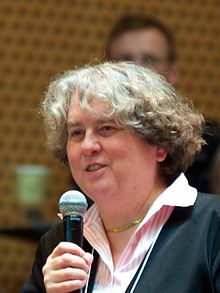Janet Pierrehumbert /pɪərˈhʌmbərt/ (born 1954) is Professor of Language Modelling in the Oxford e-Research Centre at the University of Oxford and a senior research fellow of Trinity College, Oxford.[1] She developed an intonational model which includes a grammar of intonation patterns and an explicit algorithm for calculating pitch contours in speech, as well as an account of intonational meaning.[2][3] It has been widely influential in speech technology, psycholinguistics, and theories of language form and meaning.[4] Pierrehumbert is also affiliated with the New Zealand Institute of Language Brain and Behaviour at the University of Canterbury.
Janet Pierrehumbert | |
|---|---|
 | |
| Born | 1954 (age 69–70) |
| Alma mater | MIT, Harvard |
| Awards | Member of the National Academy of Sciences, Fellow of the American Academy of Arts and Sciences, Fellow of the Linguistic Society of America |
| Scientific career | |
| Fields | Phonology, Phonetics, Cognitive Science |
| Institutions | University of Oxford, Northwestern, AT&T Bell Labs |
| Doctoral advisor | Morris Halle |
Education edit
AB Linguistics, Harvard University, 1975
PhD Linguistics, Massachusetts Institute of Technology, 1980.
Career edit
Pierrehumbert did her postdoctoral work in the Research Laboratory of Electronics at MIT. She joined AT&T Bell Labs as a member of Technical Staff in linguistics and artificial intelligence research in 1982, where her collaborators included Mary Beckman, Julia Hirschberg, and Mark Liberman. She moved to the linguistics department at Northwestern University in 1989. In 2015, she took up her present position in the Oxford e-Research Centre in the Department of Engineering Sciences at Oxford. She has held visiting appointments at Stanford University, Oxford, the Royal Institute of Technology, ENST, École Normale Supérieure, and Stockholm University. She is one of the founders of the Association for Laboratory Phonology, an interdisciplinary initiative to develop advanced scientific methods for studying language sound structure.
Research edit
Pierrehumbert's research uses experimental and computational methods to study the structure of language systems. Her current research focusses on the dynamics of the lexicon in individuals and populations. It uses large-scale text mining, computational modelling, and experiments paradigms that resemble computer games.
Honours and awards edit
Pierrehumbert received a Guggenheim Fellowship in 1996,[5] and is also a fellow of the American Academy of Arts and Sciences,[6] the Linguistic Society of America,[7] and the Cognitive Science Society.[8] She held the Edward Sapir Professorship[9] at the 2013 Linguistic Society of America Summer Institute hosted by the University of Michigan.[10] In 2019 she was elected a member of the US National Academy of Sciences.[11] She is the 2020 recipient of the Medal for Scientific Achievement from the International Speech Communication Association.
Personal life edit
Pierrehumbert is married to Raymond Pierrehumbert, Halley Professor of Physics at the University of Oxford.
References and publications edit
- ^ "Janet Pierrehumbert". Trinity College, Oxford. Retrieved 2015-10-04.
- ^ Pierrehumbert, J. B. The phonology and phonetics of English intonation Archived 2015-12-13 at the Wayback Machine. PhD thesis, MIT. Distributed 1988, Indiana University Linguistics Club.
- ^ Pierrehumbert, J. B. and Mary E. Beckman (1988) Japanese Tone Structure, Linguistic Inquiry Monograph 15, MIT Press, Cambridge. ISBN 978-0-262-66063-1
- ^ "Janet B. Pierrehumbert". Google Scholar. Retrieved 2015-10-04.
- ^ "Janet B. Pierrehumbert". John Simon Guggenheim Memorial Foundation. Retrieved 2015-10-04.
- ^ "American Academy Announces 2004 Fellows and Foreign Honorary Members". American Academy of Arts and Sciences. Retrieved 2015-10-04.
- ^ "LSA Fellows By Name". Linguistic Society of America. Retrieved 2015-10-04.
- ^ "Fellows of the Cognitive Science Society". Cognitive Science Society. Archived from the original on 2015-07-16. Retrieved 2015-10-04.
- ^ "Edward Sapir Professorship (formerly the LSA Professorship)". Linguistic Society of America. Retrieved 2015-10-04.
- ^ Queen, Robin; Coetzee, Andries. "Report on the 2013 Linguistic Institute" (PDF). Linguistic Society of America. Retrieved 2015-10-04.
- ^ "2019 NAS Election".